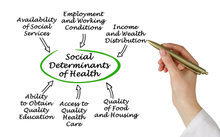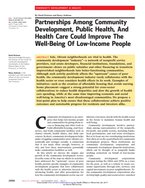Found 9 resources.
0
0
0

This paper analyzes why SNAP benefits are inadequate, reviews the body of research showing positive effects from more adequate SNAP benefits, and offers key policy solutions to improve benefit adequacy.
Topics: Food insecurity, Health, Legislation & Policy, Low-income, Nutrition, Research
 Shared by Housing Is
on Jun 11, 2019
Shared by Housing Is
on Jun 11, 2019 0
0
0
Moving Health Care Upstream (MHCU) is based on the belief that health systems can address persistent and costly health inequities by moving “upstream”—beyond the walls of hospitals and clinics and into the communities, collaborating with community-based organizations to address the root causes of disease. The various areas of work within MHCU share a common focus-supporting hospitals and community stakeholders in testing and spreading strategies to move upstream, and sharing “what works” to inform the field and accelerate the upstream movement in the field as a whole. Policy Learning Labs are...
Topics: Child welfare, Early childhood, Food insecurity, Green, Health, Housing, Legislation & Policy, Nutrition, Partnerships, Youth
 Shared by Housing Is
on May 1, 2019
Shared by Housing Is
on May 1, 2019 0
0
0

Are you a Pennsylvanian without a high school diploma? Then sign up with AmeriHealth Caritas for Medicaid and the plan will help you get your GED. Having trouble getting a job in Ohio? If you are enrolled in CareSource, the Life Services JobConnect in CareSource’s managed care organization (MCO) will arrange job coaching and other employment services at no cost. These are not examples of corporate philanthropy. Rather, they reflect a growing recognition in the health care sector, especially among managed care organizations, that good health—and achieving lower medical costs—requires a focus...
Topics: Education, Food insecurity, Health, Housing, Low-income, Nutrition, Research
 Shared by Housing Is
on Apr 25, 2019
Shared by Housing Is
on Apr 25, 2019 0
1
1

In 2015, the Supplemental Nutrition Assistance Program (SNAP) prevented 8.4 million people from living in poverty. This essential and effective safety net program helps people with low incomes purchase food for themselves and their families—an estimated 40.8 million Americans were living in poverty in 2015; absent SNAP benefits, that number would have been 49.1 million. Despite its success, SNAP is facing rule changes that would cause people to lose benefits—harming those who need it most and weakening the poverty-fighting power of the program.
Topics: Food insecurity, Health, Legislation & Policy, Low-income, Nutrition
0
0
0
The firearm, obesity, and opioid epidemics are among the most important public health crises of our time. Each epidemic has a complex etiology that challenges efforts at mitigation. From this, a central question arises for researchers, clinicians, and policymakers: How can we identify what matters most within a broad range of causal factors in these epidemics, and can we draw cross-epidemic inferences that will help inform our thinking?
Topics: Food insecurity, Health, Low-income, Nutrition, Obesity, Partnerships, Safety, Substance abuse
0
0
0
Affordable housing campaigns are not new, of course, but what is unprecedented and transformative about Opportunity Starts at Home is the scope and diversity of the partners that are joining forces to advocate for more robust and equitable federal housing policies. The campaign is advised by a Steering Committee including leading national organizations representing a wide range of interests that are working shoulder-to-shoulder to solve the affordable housing crisis.
Topics: Asset building, Child welfare, CLPHA, Community development, Early childhood, Education, Food insecurity, Funding, Health, Homelessness, Housing, Immigrants, Legislation & Policy, Low-income, Mobility, Out-of-school time, Partnerships, Racial inequalities, Safety, Seniors, Stability, Substance abuse, Youth
0
0
0
SAHF members believe that connecting residents of affordable housing with needed supports – such as educational resources or health services – can help vulnerable families and seniors achieve
a better quality of life. SAHF began the Outcomes Initiative to create a common framework for its members to demonstrate with data the impact on residents of providing housing-based services and support in the five key areas listed below.
Topics: Asset building, Cost effectiveness, Dual-generation, Education, Exercise, Food insecurity, Health, Housing, Mental health, Metrics, Nutrition, Safety, Stability
 Shared by Housing Is
on Jul 26, 2018
Shared by Housing Is
on Jul 26, 2018 0
0
0
The community development “industry”—a network of nonprofit service providers, real estate developers, financial institutions, foundations, and government—draws on public subsidies and other financing to transform impoverished neighborhoods into better-functioning communities. Although such activity positively affects the “upstream” causes of poor health, the community development industry rarely collaborates with the health sector or even considers health effects in its work. We propose a four-point plan to help ensure that existing and future collaborations achieve positive outcomes and...
Topics: Community development, Food insecurity, Funding, Health, Low-income, Partnerships, Supportive housing, Transportation
 Shared by Housing Is
on Jul 24, 2018
Shared by Housing Is
on Jul 24, 2018 0
0
0
This brief aims to bring attention to non-Medicaid funding sources that states could potentially blend or braid to address social determinants of health and other needs that are not typically covered by Medicaid. It is intended to familiarize state Medicaid, public health, and other state policymakers with the funding streams of other agencies, and sketch out a continuum of options to help states coordinate funding to better serve the needs of low-income populations. Because this brief focuses on services for adult Medicaid beneficiaries, it does not address many of the funding sources...
Topics: Cost effectiveness, Data sharing, Dual-eligibles, Food insecurity, Funding, Health, Homelessness, Housing, Legislation & Policy, Low-income, Medicaid / Medicare, Mental health, Partnerships, Research, Substance abuse
 Shared by Housing Is
on Jul 12, 2018
Shared by Housing Is
on Jul 12, 2018 

